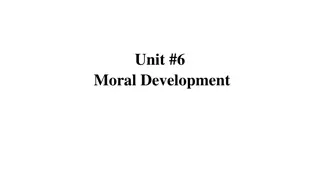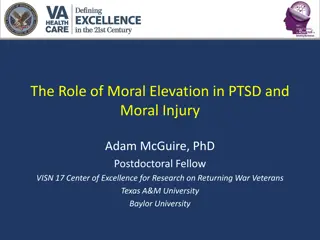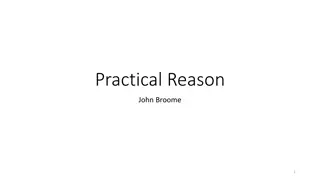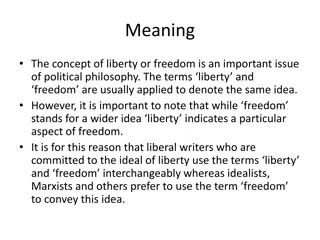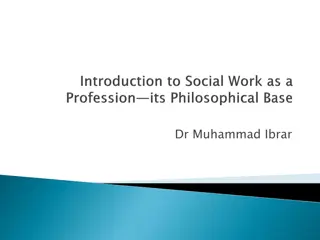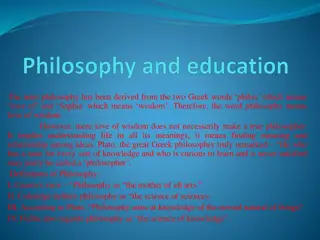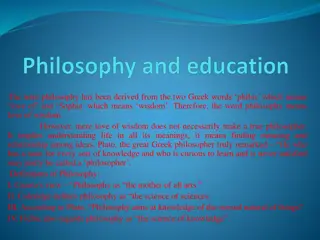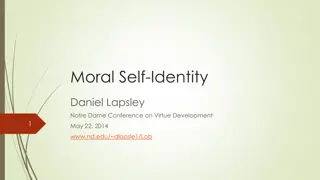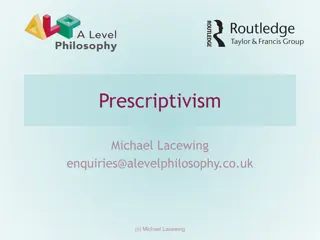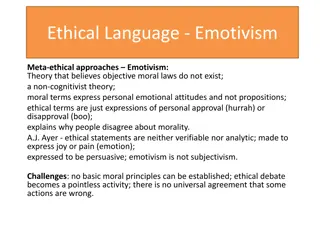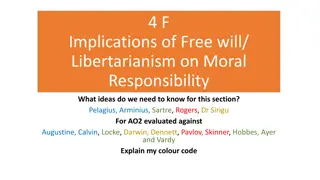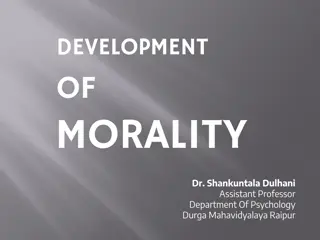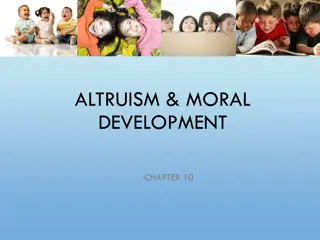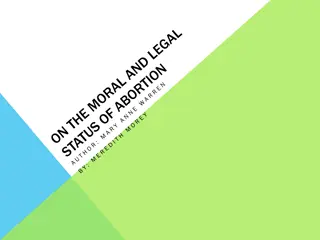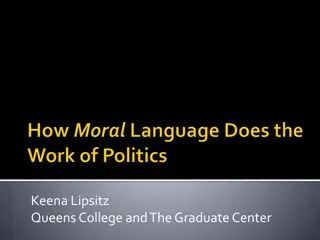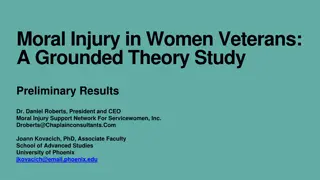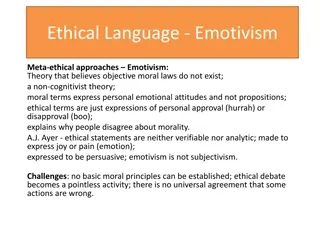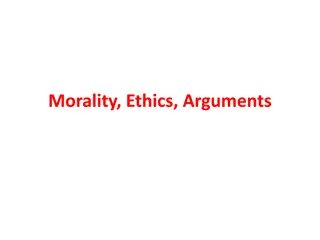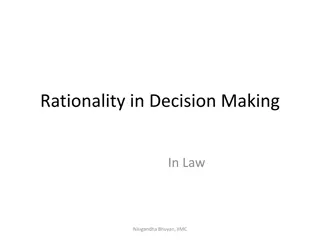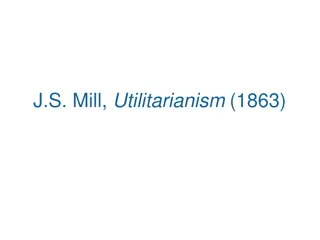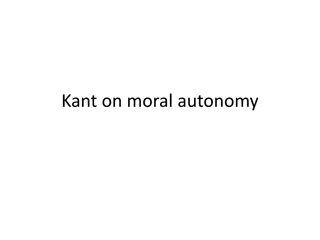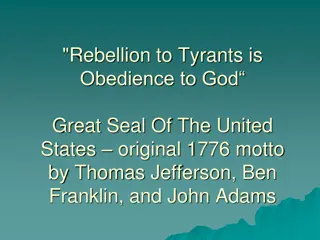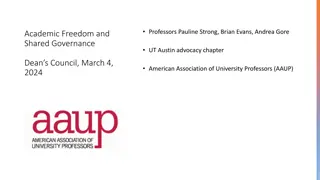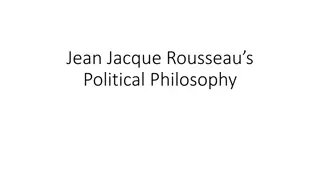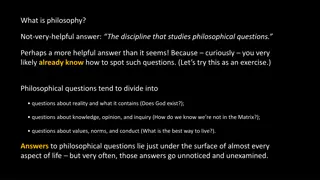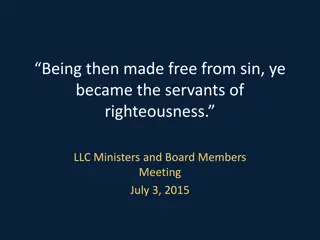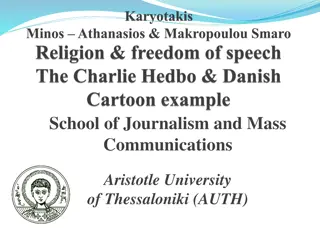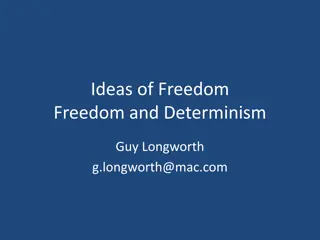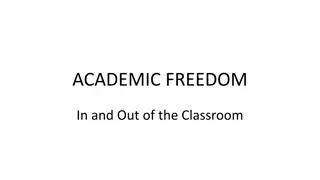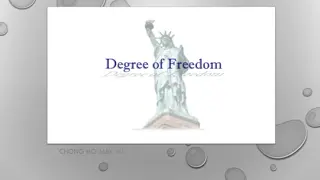Kant's Moral Philosophy: Reason, Freedom, and the State
Immanuel Kant, a prominent Enlightenment thinker, emphasizes the liberating power of human reason in guiding individuals towards moral principles and practices. Kant's moral philosophy centers on treating each person as an end-in-itself, driven by the good will informed by reason. His concept of moral freedom intertwined with duty leads to the establishment of a just social order and the necessity of the state as a means to uphold universal moral rules.
Download Presentation

Please find below an Image/Link to download the presentation.
The content on the website is provided AS IS for your information and personal use only. It may not be sold, licensed, or shared on other websites without obtaining consent from the author. Download presentation by click this link. If you encounter any issues during the download, it is possible that the publisher has removed the file from their server.
E N D
Presentation Transcript
Introduction Immanuel Kant (1724-1804), regarded as the most systematic thinker of the Enlightenment, argues that human reason is the most powerful liberating force. According to him man is destined to be driven forward by the conflict within his nature between the elements of concord and discord until he learns to submit himself to a universal law prescribed by a society of nations and thus attain eternal peace. Kant is also known as the exponent of idealism. Kant believes that reason could lead to theoretical knowledge only when carefully circumscribed. It implies that reason should always be applied with a note of caution. Normally, it is capable of legitimate practical application where it serves as a competent guide to moral principles and practice.
Keynote of Kants Moral Philosophy Kant believes that Reason is the distinctive quality of human agency which impels each person to treat himself and every other person as an end-in-itself, and not as a means to an end. The interlinkage between moral philosophy and political philosophy is the hallmark of Kant s political thought. He proceeds from the concept of moral freedom in order to arrive at the standards of political behaviour. There is a clear impact of Rousseau s concept of the real will here. Though influenced by Rousseau Kant develops it in his own way.
Keynote(contd.) Kant identifies the real will as good will , as it is concerned with good of individual as well as society. It represents that aspect of individual s will which is inspired by Reason. It is Reason which impels the individual to realize that each individual should be treated as an end-in-itself, not as a means to serve another s interest. This idea culminates in his sense of duty. Kant argues that individual s freedom lies in fulfilling his will that is informed by his sense of duty. Hence his moral freedom coincides with his true freedom.
Kants Individualism- Different from Liberal Mode Since the source of moral freedom lies in the individual himself and not elsewhere, Kant is regarded as an individualist. But his individualism is quite different from liberal view of individualism. While liberal view of individualism envisages each individual pursuing his own good according to his own judgement, Kants projects a social order in which all individuals think alike because they are informed by an identical sense of duty . In this respect, Kant s view corresponds to Rousseau s concept of the General Will.
Moral Freedom and the State Kant argues that when the sense of duty imparts identical consciousness to all individuals, it may be expressed as a universal rule. For example, when Reason directs all individuals do not steal , it becomes a universal rule. An aggregate of such universal rules is identified as law which needs the state for its enforcement. Hence the very idea of moral freedom is the reason behind the existence of the state. According to this argument the state is the product of the social contract. It is through this contract that people surrender their external freedom so as to regain their true freedom as members of a commonwealth.
The State and the Social Contract The people use this instrument in order to exchange their wild, lawless freedom for their perfect freedom. This freedom would never be lost because it emanates from their free, legislative will . Kant argues that men should enter into any relation with each other only at their free will. Hence the objective of any contract should be the mutual benefit of the contracting parties, and not to promote the interest of any one party. It is important to note that the character of the rational negotiators envisaged by John Rawls in his theory of justice corresponds to Kant s concept of men acting at their free will.
Kants Epistemology: Practical Reason and Human Dignity Kant argues that our knowledge about the universe is based on the subtle and dispersed signals obtained through our sense-organs (i.e. the organs of sight, sound, smell, taste and touch) which are integrated by our mind and translated into meaningful existence. So the knowledge of this world obtained by us is circumscribed by the capability of the knower. It is not possible for us to know the world as it is in the real sense. In other words, our sense-organs are incapable to perceive the true nature of the universe. We are therefore left with only one alternative , that is to apply our practical reason to inquire into the relation between our mind and the universe.
Moral Law: The Foundation of Metaphysics Kant holds that our concepts are formed within the context of various human activities involving labour, science, arts, etc. which seek to mould the universe for fulfilling human needs and objectives. Man s practical reason is not determined by cause and effect relationship of the physical world, but it is capable of distinguishing between good and evil. It is therefore guided by the moral law which should be recognized as the foundation of metaphysics. Thus Kant propounds the theory of sovereignty of moral law.
Moral Law and the Concept of Human Dignity The maxim of moral law in Kant s philosophy leads to the concept of human dignity. It holds that each human being is entitled to a special regard only because it is a human being. In other words, every human being is, by nature, endowed with a unique quality, that is human dignity which cannot be exchanged for any worldly value. Kant distinguished between two types of ought- statements: categorical and hypothetical in his Groundwork of the Metaphysic of Morals (1785). The hypothetical statement suggests what an agent ought to do when desires to achieve some objective.
Categorical and Hypothetical On the other hand, the categorical statement prescribes what ought to be done independently of such condition. Kant argues that only a categorical statement suggests an action that has genuine moral worth. Accordingly, categorical imperative implies what an individual ought to do independently of any desire to achieve a specific end. Kant identified three formulations of this principle: i. One ought to act only according to that maxim by which he can will at the same time that it should become a universal law;
Formulations of Categorical Imperative ii. One ought to act in such a way that he always treats humanity, whether in his own person or in the person of any other, never simply as a means but always at the same time as an end; and finally, iii. One ought to act as though he were through his maxims a law-making member of a kingdom of ends . In a nutshell, the categorical imperative directs the individual to transcend her/his personal ends, identify the ends concerning all humanity, and ceaselessly pursue only those ends.
Close Relation between Morality and Politics Kant strongly recommends that morality and politics should be closely related. According to him, true politics cannot take a single step without first paying homage to morals . Kant draws a clear distinction between moral motives and legal motives. Moral motive refers to acting from good will or respect for moral law. On the other hand, legal motive refers to acting from the fear of law. Now politics can be utilized for the reconstruction of legal institutions. Since politics operates on the strength of legal motive, it cannot be seen as a manifestation of good will. A better legal order may prove conducive to moral order, yet as long as it is based on legal motive, it is bound to remain inferior to moral order.
Public Legal Justice and Eternal Peace Kant argues that if politics could be shaped by morality, it would be instrumental to promoting public legal justice by forbidding war and insisting on eternal peace as well as the rights of man . The concept of human dignity can serve as a bridge between morality and public legal justice. This can also serve as a bridge between arts and morality. If all individuals had good will, they would respect all others as ends -indeed as members of the kingdom of ends . Then a perfect moral order would come into existence. But since men are by nature inclined to evil as well as good, founding of an effective legal order becomes necessary. It is therefore imperative that legal order is designed to serve the moral ends as effectively as possible.
Republicanism and Moral Ends Kant apprehends that a sovereign authority may tend to violate the rights of man by treating men as means to serve its self-interest. War is a glaring example of misuse of sovereign authority; it is a powerful instrument of fulfilling some immoral purpose of the rulers, e.g. territorial aggrandizement. In order to overcome this problem, Kant hopes that a healthy politics would be conducted on the lines of republicanism. Under this arrangement, people would rise above the status of subjects and become full- fledged citizens . In short, Kant wants politics to serve moral ends through the instrument of law. He hopes that the citizens of a republic would never consent to a decision for war.



